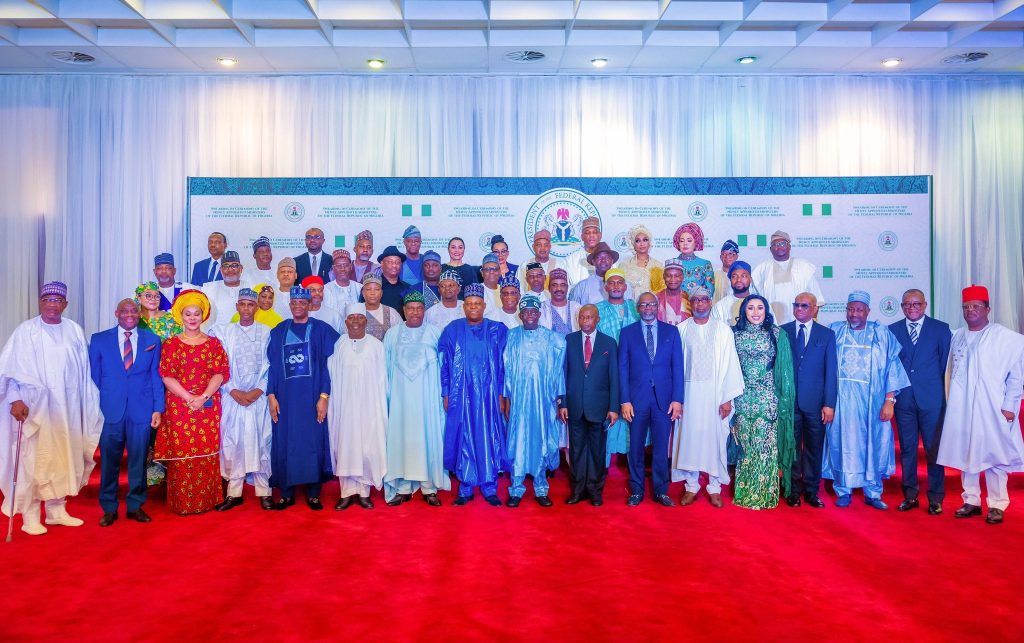During his campaign, President Bola Tinubu vowed to assemble a team of experts, individuals with proven track records and expertise in their respective fields, who would contribute to Nigeria’s growth and development.
However, the unveiled cabinet suggests that the bonds of loyalty forged during the election have taken precedence over qualifications.
Out of the 48 nominees the president submitted to the Senate in three groups for approval, 45 received confirmation while three were rejected, ostensibly due to pending “security clearance”.
While there are a few acknowledged experts on the team, others given sensitive portfolios elicit fear rather than hope for better days ahead.
The Strategic choices
Individuals like Dave Umahi, Wale Edun, Ali Pate, Bosun Tijani, Nyesom Wike and Olasunkanmi Fagbemi were perceived to have been given befitting portfolios.
Umahi’s selection for the Ministry of Works showcases Tinubu’s strategic choice, harnessing Umahi’s background in civil engineering and extensive tenure as deputy governor and governor (2011-2023) to amplify his impact in the capacity.
Similarly, Edun’s appointment as Minister of Finance and Coordinating Minister of the Economy finds its roots in his substantial experience, spanning economics, international finance, merchant banking, and corporate finance within esteemed national and global organisations and also his time as Tinubu’s finance commissioner between 1999 and 2007.
Pate’s designation to the health ministry harmoniously aligns with his global recognition as an academic and public health authority, bolstered by his service at the World Bank, equipping him with the expertise necessary for this responsibility.
The president’s nomination of Bosun Tijani for the Ministry of Communications, Innovation, and Digital Economy finds validation in his credentials, as he exhibited adeptness in digital creativity, innovation, ICT, and communication.
While President Tinubu’s move to assign Nyesom Wike to the FCT ministry has been hailed as a calculated step, although dissenting voices also echo. Wike’s pivotal role in the division of the PDP and his transformative governance record paved his path to this appointment.
He’s known as ‘Mr. Project’ for his achievements as the governor of Rivers State, and now his challenge is to breathe new life into the FCT, becoming its first minister from the southern part of the country since 1979.
The round pegs in square holes
One of the most perplexing appointments is that of Abubakar Momoh, a 62-year-old man who was initially appointed as the minister of youth.
This choice, although immediately reversed due to backlash from Nigerians, starkly contradicts the principle of putting individuals with relevant experience and fresh perspectives in charge of portfolios aligned with their expertise.
Similarly, the appointment of a former state governor, Bello Matawalle as the minister of defence raised eyebrows. While it is essential to acknowledge the value of administrative experience, it is equally vital to ensure that the individual appointed possesses a profound understanding of the complexities and evolving challenges of national security. The unsettling state of banditry in his state, his lacklustre performance during his tenure and allegations of corruption underscore the importance of placing a seasoned expert at the helm of the defence ministry.
Yet another incongruous fit is observed in Atiku Bagudu’s appointment to lead the critical and intricate Budget and Economic Planning portfolio, integral to Tinubu’s developmental vision for the nation. While his commendable expertise in finance and economics qualifies him for the role, the shadow of his past misdeeds casts a significant stain.
Other appointments that are not so bad but are still strategically wrong include the appointment of Dele Alake to the Solid Minerals Development Ministry and of Festus Keyamo to the Aviation Ministry. These two, who would have been better fit in other ministries, will have to rely on technical assistants to guide them through.
Legal consequences?
While no legal mandate dictates that a minister’s portfolio must align with their educational qualifications and career background, it remains more conducive for ministers to thrive in roles that align with their expertise and experience.
The disconnect between promised technocratic excellence and the reality of political appointments raises legitimate concerns about the administration’s priorities.
Nigeria deserves a cabinet that is not only loyal but also truly capable of navigating the nation towards progress, irrespective of political affiliations.
